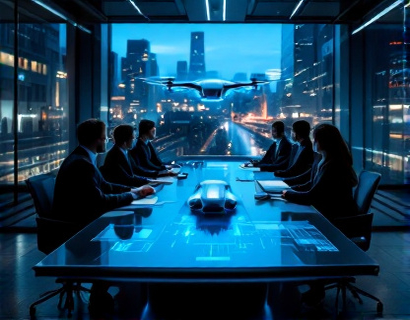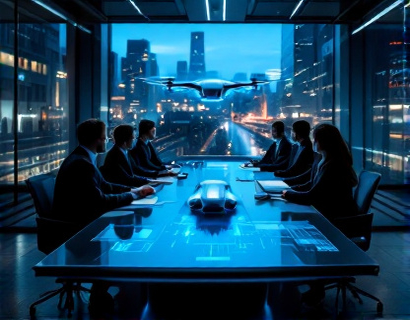AI-Powered Aeronautics: Streamlining Operations with Intelligent Agent Solutions
The aeronautics industry stands at the forefront of technological innovation, constantly seeking ways to enhance efficiency, safety, and sustainability. One of the most transformative forces in this sector is the integration of Artificial Intelligence (AI) through intelligent agent solutions. These AI agents are revolutionizing the way aeronautics businesses operate, offering sophisticated tools that streamline processes, optimize decision-making, and provide tailored insights. This article delves into the pivotal role of AI agents in the aeronautics industry, exploring how they are driving innovation and sustainable growth.
Enhancing Operational Efficiency
Operational efficiency is a critical factor for aeronautics companies, where every minute and every resource counts. AI agents play a crucial role in streamlining operations by automating routine tasks, reducing manual errors, and optimizing resource allocation. For instance, AI-powered agents can manage flight schedules, maintenance routines, and crew assignments with precision. By analyzing vast amounts of data in real-time, these agents can identify the most efficient flight paths, reducing fuel consumption and lowering operational costs. This not only enhances productivity but also contributes to environmental sustainability by minimizing carbon emissions.
Moreover, AI agents can predict and prevent equipment failures through predictive maintenance. By monitoring the health of aircraft systems and components, these agents can detect anomalies and schedule maintenance proactively. This approach ensures that aircraft are always in optimal condition, reducing downtime and extending the lifespan of equipment. The ability to perform these tasks with high accuracy and speed is a significant advantage over traditional methods, which often rely on manual inspections and less frequent maintenance checks.
Optimizing Decision-Making
Decision-making in the aeronautics industry is complex and multifaceted, involving numerous stakeholders and variables. AI agents enhance this process by providing data-driven insights and recommendations. These agents can analyze historical data, market trends, and real-time information to offer strategic advice on various aspects of business operations. For example, AI can assist in route optimization by considering factors such as weather conditions, air traffic, and fuel prices to determine the most cost-effective and timely routes. This level of analysis enables airlines to make informed decisions that maximize profitability and minimize risks.
Additionally, AI agents can support decision-making in customer service and sales. By analyzing customer data, these agents can predict passenger preferences and behavior, allowing airlines to tailor their services and offerings. Personalized marketing strategies and targeted promotions can lead to higher customer satisfaction and increased loyalty. In a competitive market, the ability to understand and meet customer needs effectively is a significant differentiator.
Delivering Tailored Insights
One of the most valuable contributions of AI agents in aeronautics is their ability to deliver tailored insights. Each aeronautics business faces unique challenges and opportunities, and a one-size-fits-all approach is often insufficient. AI agents can process and analyze vast datasets specific to an organization’s operations, providing insights that are both relevant and actionable. For instance, an AI agent can identify patterns in flight delays, helping an airline to pinpoint the root causes and implement targeted solutions. This level of customization ensures that businesses can address their specific pain points and capitalize on their strengths.
Furthermore, AI agents can facilitate better collaboration and communication within organizations. By integrating with existing systems and providing a unified view of operations, these agents help break down silos and foster a more cohesive work environment. This integration enables real-time data sharing and collaborative decision-making, which is essential in a dynamic industry where rapid responses to changing conditions are crucial.
Driving Innovation
Innovation is the lifeblood of the aeronautics industry, and AI agents are at the forefront of this transformation. By leveraging machine learning and advanced analytics, AI agents can identify new opportunities and drive technological advancements. For example, AI can assist in the development of more efficient aircraft designs by simulating various configurations and materials, predicting performance and durability. This accelerates the design and testing process, bringing innovative solutions to market faster.
AI agents also play a role in enhancing safety through continuous monitoring and analysis. By detecting potential safety risks and anomalies in real-time, these agents can alert operators to take corrective actions before incidents occur. This proactive approach to safety not only protects passengers and crew but also builds trust and confidence among customers and regulators.
Maintaining a Competitive Edge
In an industry characterized by intense competition and rapid change, maintaining a competitive edge is paramount. AI agents provide aeronautics businesses with the tools they need to stay ahead of the curve. By automating routine tasks and providing data-driven insights, these agents free up valuable time and resources, allowing companies to focus on strategic initiatives. This efficiency gain is crucial for businesses looking to innovate and expand in a fast-paced market.
Moreover, the adaptability of AI agents means that they can evolve alongside the industry. As new challenges and opportunities emerge, these agents can be retrained and updated to address the latest trends and technologies. This flexibility ensures that aeronautics businesses remain agile and responsive, capable of seizing new opportunities as they arise.
Case Studies and Real-World Applications
To better understand the impact of AI agents in aeronautics, let’s examine a few real-world applications. One notable example is the use of AI in air traffic management. AI agents can process and analyze data from multiple sources, including radar, weather reports, and aircraft communications, to optimize flight paths and reduce congestion. This has led to more efficient airspace utilization and shorter flight times, benefiting both airlines and passengers.
Another application is in predictive maintenance for ground support equipment. AI agents can monitor the performance of vehicles and machinery used at airports, predicting when maintenance is needed and preventing unexpected breakdowns. This not only reduces downtime but also lowers maintenance costs, contributing to overall operational efficiency.
In the realm of customer service, AI agents are being used to enhance the passenger experience. Chatbots and virtual assistants powered by AI can handle a wide range of inquiries, from booking flights to providing travel updates. These agents offer 24/7 support, ensuring that customer needs are met at any time, which significantly improves customer satisfaction.
Challenges and Considerations
While the benefits of AI agents in aeronautics are clear, there are also challenges and considerations that need to be addressed. One of the primary concerns is data security and privacy. Aeronautics businesses handle sensitive information, and ensuring the protection of this data is critical. Implementing robust security measures and adhering to regulatory standards are essential to mitigate risks.
Another challenge is the integration of AI agents with existing systems. Legacy systems may require significant updates or overhauls to fully leverage AI capabilities. Collaboration with technology providers and a phased approach to integration can help overcome these hurdles. Additionally, there is a need for skilled professionals who can develop, maintain, and optimize AI agents, highlighting the importance of investing in training and development.
Future Prospects
The future of AI in aeronautics is promising, with ongoing advancements poised to bring even greater benefits. As AI technologies continue to evolve, we can expect more sophisticated agents that can handle more complex tasks and provide deeper insights. The integration of AI with other emerging technologies, such as the Internet of Things (IoT) and blockchain, will further enhance the capabilities of aeronautics businesses.
Sustainability will remain a key focus, with AI agents playing a crucial role in reducing the environmental impact of air travel. Innovations in fuel efficiency, alternative fuels, and sustainable aviation practices will be driven by AI-driven insights and optimizations. As the industry moves towards a more sustainable future, AI will be an indispensable tool in achieving these goals.
In conclusion, AI agents are transforming the aeronautics industry by streamlining operations, enhancing decision-making, and driving innovation. By embracing these intelligent solutions, aeronautics businesses can achieve sustainable growth, maintain a competitive edge, and contribute to a safer, more efficient, and environmentally friendly aviation sector.










































